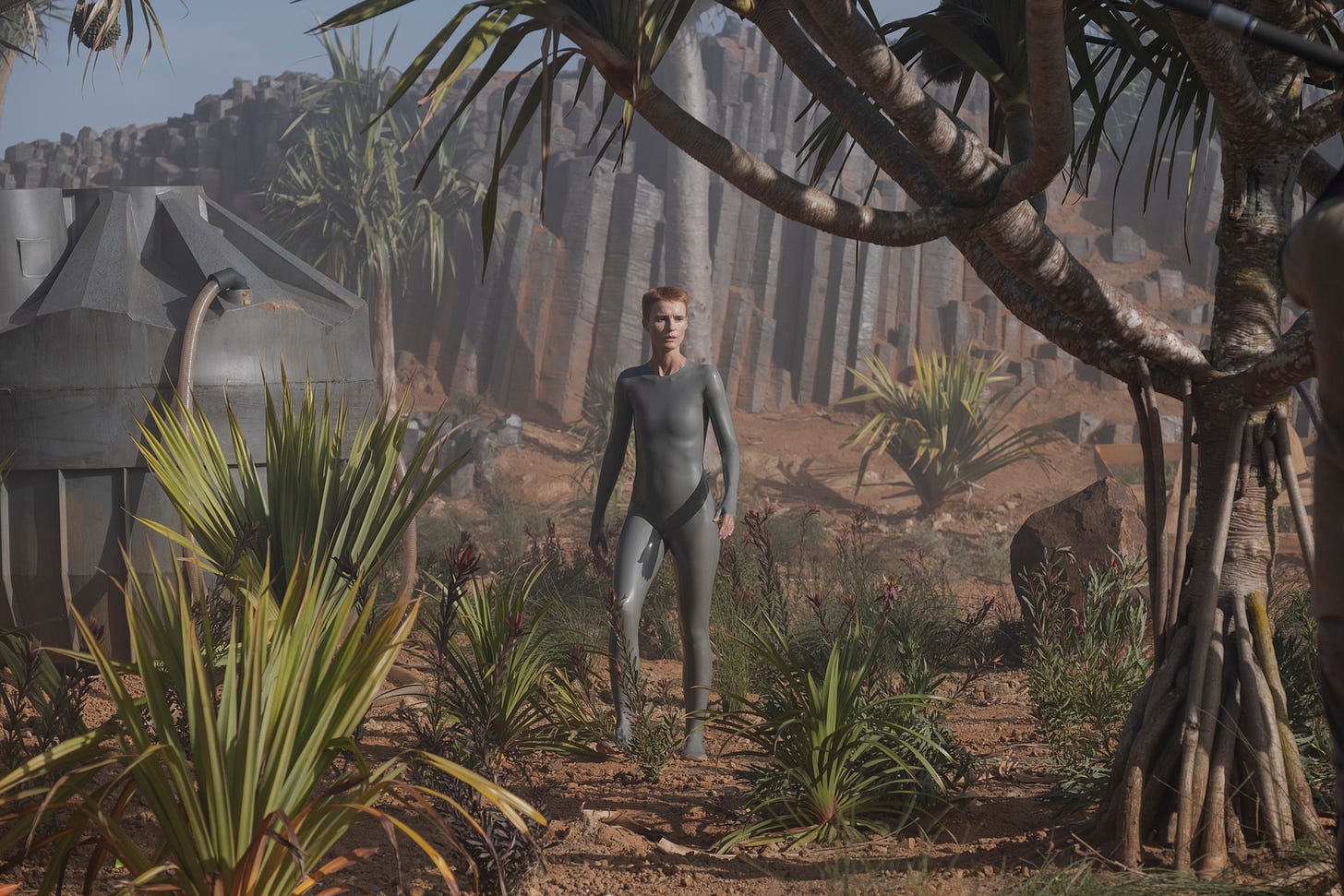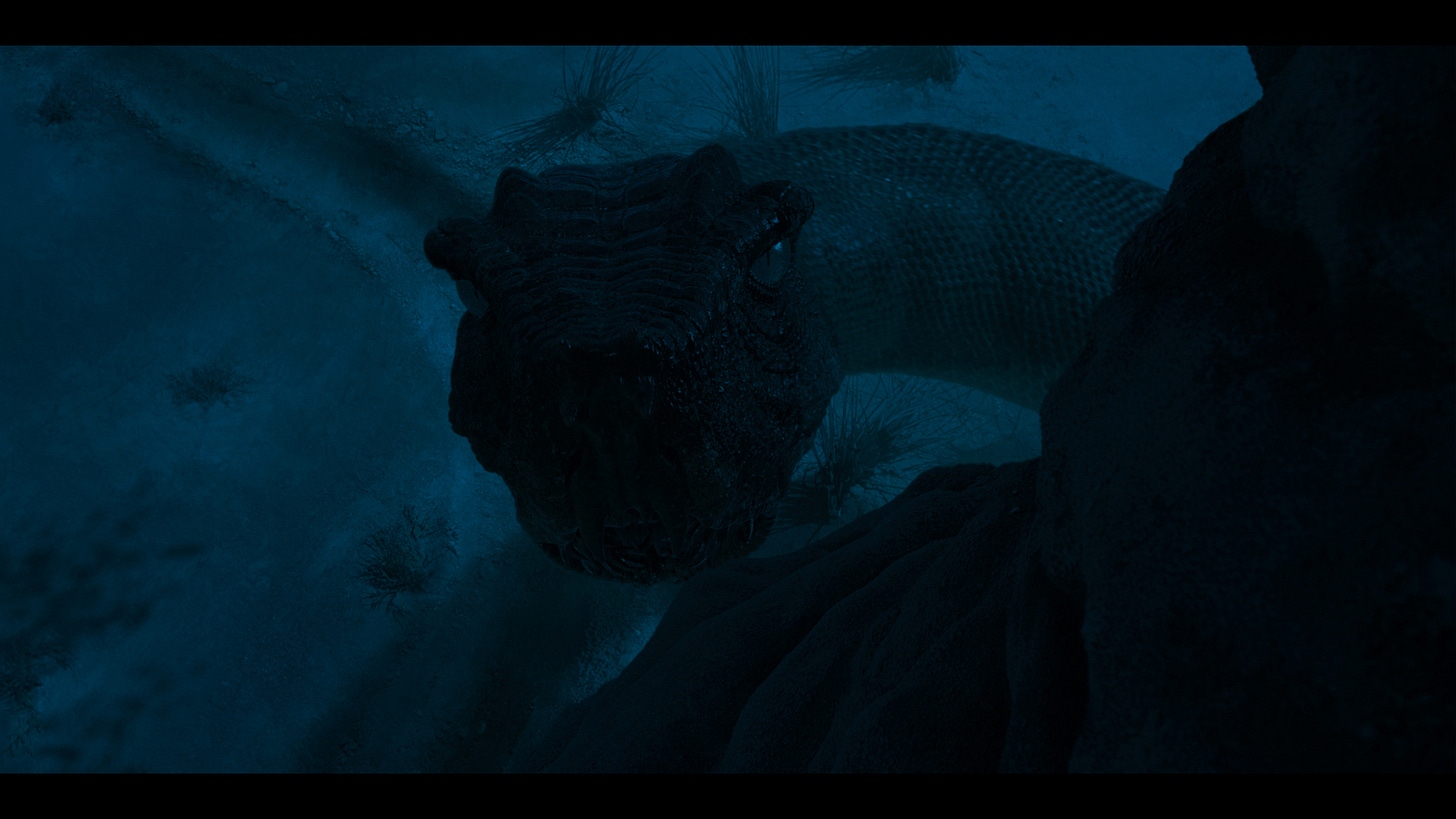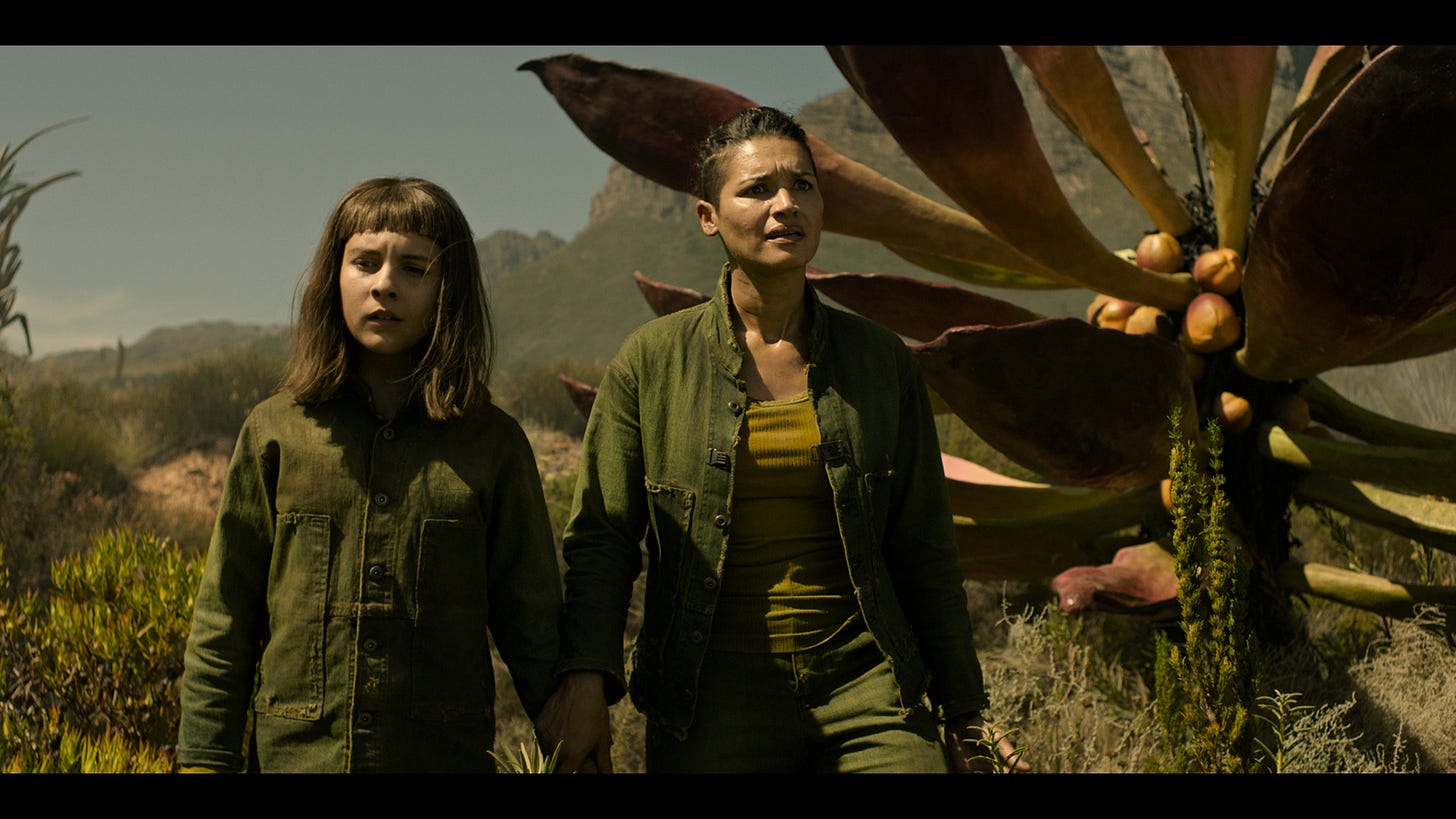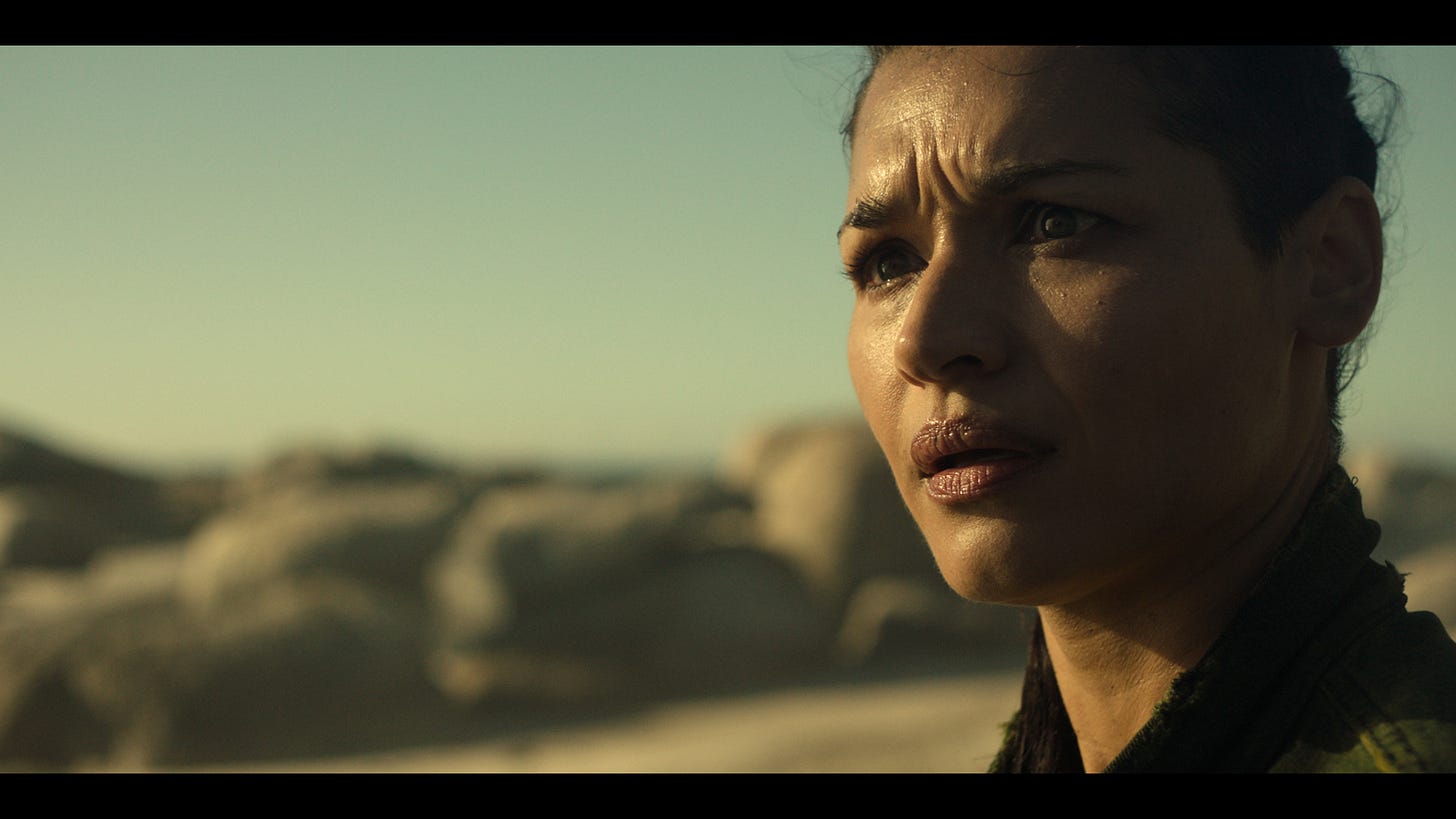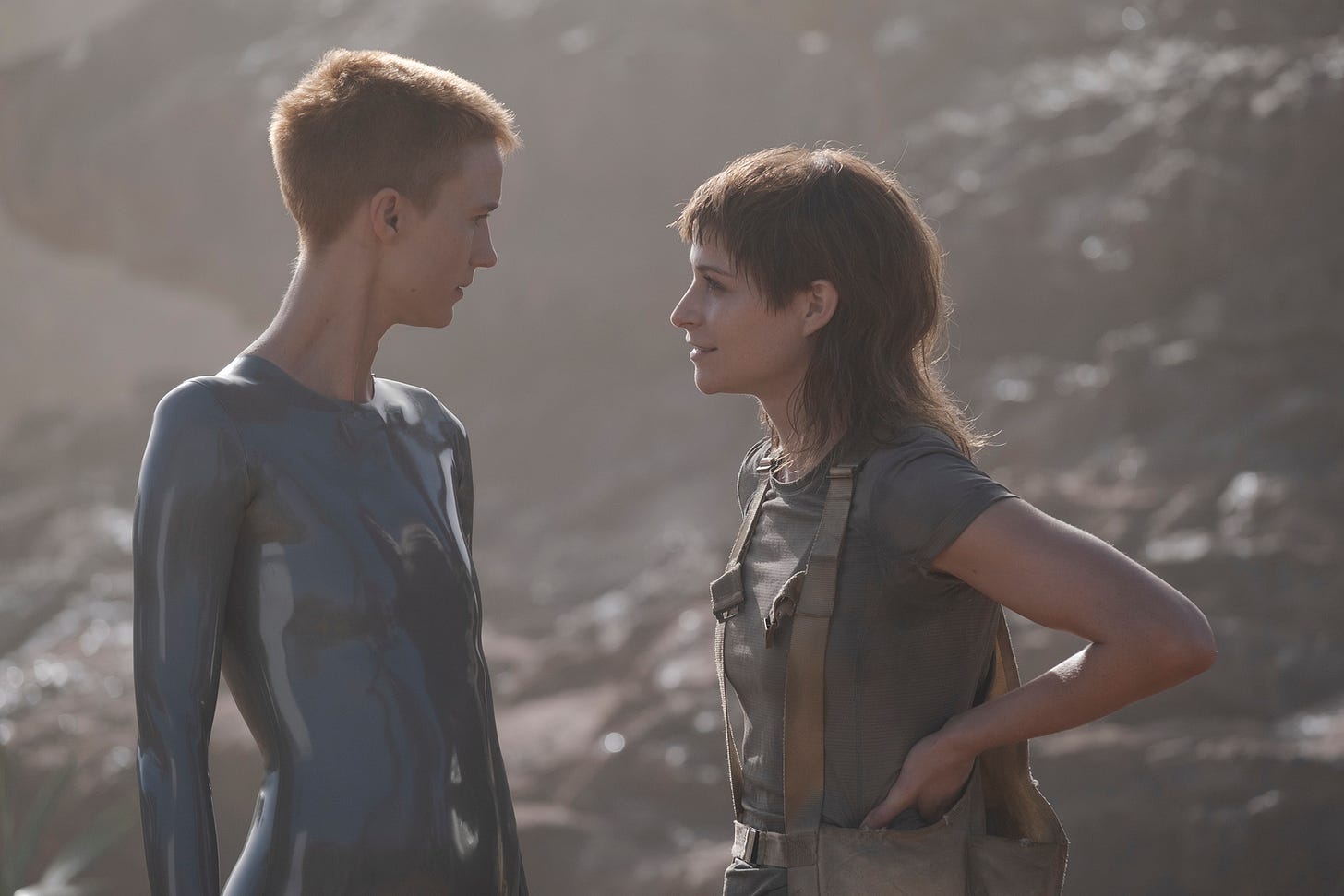'Raised By Wolves' Season 2, Episode 2 Review: Mother Of Serpents
In which Mother sets out to kill Number Seven, and Campion sets out to save it.
I love the retro B-movie vibe Raised By Wolves manages to pull off. It feels like a science-fiction plucked from the late 1960s’ or early 1970s’. The world-building is terrific, but there’s a fakeness to it that’s a bit jarring, yet still works.
The landscape of Kepler-22b this time around is much more distinct and vivid in the tropical zone. Massive Baobab trees jut out from the red-brown earth. Sheer rock outcroppings jut out in geometrical formations. The nearby acid ocean offers no fish, but there’s plenty of fruit to choose from.
And one very large, very menacing serpent.
Mother’s first natural-born (“natural”-born?) child, Number Seven, returns in Episode 2—aptly titled “Seven”—and I’m not sure what to make of the creature. Is it a terrifying predator? An intelligent and curious baby snake? Something to be feared and hunted, killed and eaten? Or a key to the planet’s secrets?
The Atheist Collective, as well as Father, seem pretty certain it’s a dangerous menace after the creature pulled a mobile housing unit filled with nine settlers into the acid water.
But the creature didn’t harm Campion when he came across him trying to put an egg back in its nest on top of a bulbous tree. Mother’s teats start dripping “milk” when she comes across the serpent, hovering over the unconscious form of Campion at night, the boy having fallen out of the tree. And while Father urges Mother to kill it, Mother’s resolve is clearly brittle.
Perhaps this is a motherly instinct, but it is also a new side to our most diabolical android.
When The Trust tasks her with punishing the Atheist soldier, Tamerlane, who lit the sun-shaped fire outside their home, she carries out the assignment with great reluctance. Violence isn’t coming quite so easily to the Necromancer now that her Eyes are gone. Now that she’s found a place she’d like to call home, in spite of all the red flags.
A New Family
Elsewhere, Marcus continues to build his church. His new family.
Marcus is a manipulative bastard. He is clearly seducing Decima, though he’s not motivated by sex. He wants to be rid of her android daughter, Vrille. When Decima lost her real daughter, she had an imprint of her placed into the robot. It’s the next best thing, and Decima clings to her like memories made flesh.
Marcus despises androids, though he certainly finds uses for the girl.
After the punishment of Tamerlane, the soldier is forced by the Trust to apologize and make amends to Mother, Father and the children, as well as the entire collective. This is a bridge too far for the man. He flees the Collective. Soldiers and tanks are sent after him, but Marcus and company get to him first, and Marcus leads him back to the sea caves that lay below his cathedral home.
The soldiers that follow are caught by the rising tide and melted by the acid water. Marcus brings Tamerlane, Decima and the android to safety and begins working on Tamerlane’s faith. “I just want to think for myself,” the jaded soldier tells him at one point.
Marcus assures him that he would never tell him how to think. What he’s starting isn’t like what the elitists back on Earth tried to do, filled with rules and hierarchy. What Marcus is trying to start is “more like a family.” It’s about love and taking care of one another, not telling one another what to do.
But Marcus knows how to get people to do his bidding without making it obvious. He’s a master manipulator. Everything he does is calculated.
When they decide to take down a tank and commandeer it from its Atheist operators, Marcus says he’ll lay underneath the vehicle and jam an explosive into its engine. Decima is worried—what if he’s killed? Tamerlane, now eager to show his worth in this new group, volunteers instead—which was clearly Marcus’s plan all along.
They successfully take the tank and very nearly capture one of its crew, but the serpent flies by and creates a distraction. The Atheist goes for his gun and Marcus kills him. He’s instantly filled with anger and remorse. “Why’d you have to go and do that, man?” he asks. “Sol sent me here to convert these people, not kill them!” Desperate, he turns to Decima. “Can you do anything for him?” he asks. But she’s not a medic, and the man dies.
They find a diagram of the serpent in the tank and Decima theorizes that the creature could be the “sword” in the weird Mithraic prophecy. Apparently the chosen one has to “tame the sword” so this makes sense—especially if it’s Campion, rather than Marcus or Paul, who ultimately tames the beast.
The android, Vrille, is supposed to help them track the serpent but Decima says she’s overloaded and Marcus allows her to send the girl back home to rest. Along the way she’s attacked by a second tank and barely escapes. Her leg is wounded, however, and when she comes across Paul and Campion, she implores them for help. Paul wants to leave her. To him, androids are useful but untrustworthy. Campion, naturally, feels otherwise. To Campion, all creatures great and small are worthy of respect and compassion. He agrees to help the girl, and she agrees to help them track Seven.
Mother Of Dragons
All told, a very interesting second episode of the second season. The religiosity and prophecy elements, as well as the goofy Medieval looking armor, all make this a very unique sci-fi show—a cold, dark, vivid space opera. It has that Alien feel to it, no doubt, but with much more of a focus on the mystical. There are lots of shows that make us think about the role of AI in future society—Westworld, Star Trek Picard, Terminator, etc.—but few couple this with such unbridled mysticism and magical realism.
The mysterious signal that seems to have corrupted both Marcus and Paul (and others in the Mithraic group) apparently has no sway in the tropical zone, at least according to Sue who discovered that intel when going through the Trust’s planetary analysis. So there is some kind of signal on the planet, but what it wants and from whence it stems remains a mystery. Is the signal coming from some ancient Kepler-22b tech, or is the voice of some dark god? Raised By Wolves doesn’t make the answers obvious.
Mother goes to search for her serpent baby with a massive ballista/crossbow and finds its shed skin hanging from a cliff wall. The creature is growing, shedding its skin for a larger size. Mother touches it wistfully and then screws up her face in anger. “You don’t deserve to live!” she shrieks, but one wonders if her heart is in it. When she comes across her flying snake baby, will she be able to pull the trigger?
Scattered Thoughts
I like Sue. I like that she brings the kids an assault rifle she found laying around. Father is happy about this, too, though Mother accuses Sue of thinking she can’t protect her own kids. Later, when they can’t find Paul, Sue really does question her ability.
That ‘punisher’ costume the Trust had Mother wear when she beat the crap out of Tamerlane was creepy as hell. I’m increasingly of the mind that the Trust really is some kind of mad AI with a twisted sense of irony and a penchant toward the very violence it condemns (the whole ‘violence is hatred, hatred is violence’ chant is awfully religious sounding for an Atheist AI, no?)
Cleaver is an interesting dude. He’s been the Trust’s right-hand man since the AI was created by the OG Campion. He follows the AI blindly. His faith in the computer’s judgment is absolute. Indeed, the Atheists seem every bit as fanatical in their beliefs as the Mithraic.
Father’s discovery of an android “skeleton” that’s at least one million years old is pretty wild. Mother seems utterly unfazed by the revelation. But seriously, this is huge. Kepler-22b clearly has an ancient, high-tech past civilization that we’re just scratching the surface of—and one that is tied indelibly to the belief systems of Earth. Also, what’s up with the berries that grow out of the android’s ‘bones’—didn’t something similar happen with snake bones in season 1?
Is the planet itself some kind of AI using its new visitors as a way to revive itself from an age-long slumber? The weird confluence of AI and organic life here suggests that something is very different about this planet than our own.
Every time Marcus whips out a new gadget I’m like:




